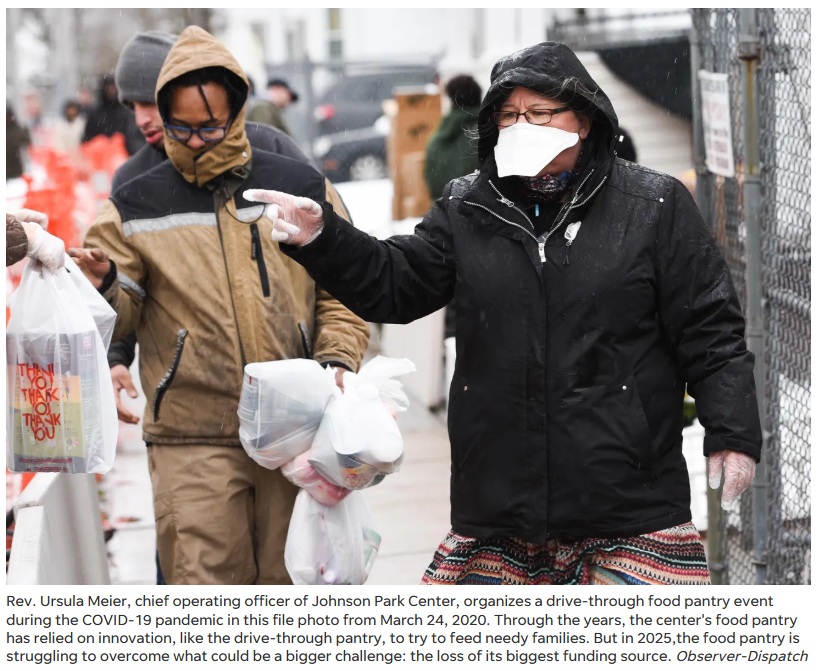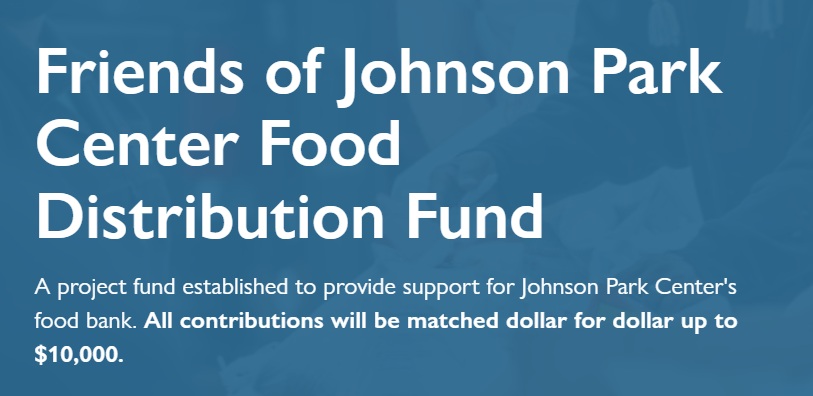
Johnson Park food pantry loses United Way grant, its biggest: ‘Our shelves are empty’
Utica Observer Dispatch
- People who turn to the food pantry at Johnson Park Center in Utica’s Cornhill neighborhood get enough food to make meals for their households for five days.
- After losing its biggest grant, the pantry’s shelves are bare and the pantry may not be able to help as much this winter, its director said.
- Rev. Ursula Meier, COO of Johnson Park Center, said she didn’t know why her grant wasn’t renewed after many years.
The Johnson Park Center food pantry, which distributes food to residents of the Cornhill section of Utica and beyond — including almost 2,000 households in August — is in financial trouble.
The United Way of the Mohawk Valley, which had been providing $30,000 a year for the center’s pantry program, cut all of the center’s pantry funding for this fiscal year, said Rev. Ursula Meier, Johnson Park’s chief operations officer.
“We can’t recoup that money,” she said. “It’s not possible. We don’t know why they did it. We are still the biggest food pantry. We have the most service providers come to us. We are the most innovative.”
The Johnson Park pantry also lost a $10,000 grant from FEMA’s emergency food and shelter program, Meier said. That program was frozen early this year and there’s been no word on it since then, said Brian McManus, chief operations officer of the Food Bank of Central New York.
“We are really struggling,” Meier said. “We right now live from week to week. Our shelves are empty. We haven’t gotten enough food from the food bank to supplement (the loss). So our food pantry is empty for the first time ever.”
Faith help will come
For now, the pantry is operating as usual on Meier’s faith that help will come. But if it doesn’t get more money by October, it will have to cut back on how much help it can provide struggling families, Meier said.
“I’m hoping for a miracle,” Meier said. “That’s why we haven’t made adjustments yet, but it’s going to have to happen unless there’s funding coming in from somewhere.”

United Way explanation
Meier has been with Johnson Park for 28 years and its pantry has been operating at least that long, she said. For years, it’s relied on the support it gets from the United Way.
United Way unveiled a 2025-2027 strategic plan on July 1 that outlines three key impact areas for the agency: health and wellness, economic stability and community responsiveness. The plan includes three specific focus areas under health and wellness: food insecurity, access to mental health care and programs to support people who misuse drugs and alcohol.
Johnson Park Center certainly does critical work with big impact to help those in need, United Way CEO Susan Litera said.
“As you can imagine, our funding requests are numerous and these decisions are complex and require intense, yet deliberate discussion,” she said, explaining the decision not to fund the Johnson Park pantry this year. “Our role is to review all applications and make the best decisions for the entire community. Our funding priorities include addressing food insecurity and we are supporting local food pantries to support this effort.”
Other funding
Over the summer, the Johnson Park food pantry’s saving grace has been, Meier said, the food it’s received from Compassion Coalition through a $725,000 USDA grant as part of the New York Food for New York Famiies program.
The grant allowed Compassion Coalition to buy food products that were grown or made in New York State — things like fresh or frozen produce, meat, dairy products, even condiments —.to distribute to six local nonprofits: Johnson Park, Hope House, the Rescue Mission of Utica, the Salvation Army of Utica, Feed Our Vets and Catholic Charities of Herkimer County.
But, the grant ended at the end of August.
The food pantry does also receive support from the Food Bank of Central New York, from community donations and through the Friends of Johnson Park Center Food Distribution Fund at the Community Foundation of Herkimer & Oneida Counties.
An anonymous donor matches donations to that fund up to $10,000.
The food pantry has been giving out five days’ worth of food up to twice a month, more than the three days’ worth once a month required by the food bank. And the pantry hands out all the ingredients for meals, not just random foods, Meier said.
But, without more help, it’s going to have to cut back on the amount of food given out per visit and/or the number of times a household can come for help, she said.More: Utica Food Pantry celebrates move and expansion on Elizabeth StreetMore: Noah Gerling at sentencing for mother’s killer: ‘There is no closure, no justice’
It’s really hard to put together everything needed for nutritious meals simply using the food pantries can get through the food bank, Meier said. But without more grants, the pantry doesn’t have the money to buy the missing pieces, she said.
How to help
If the community wants to help out, Meier would welcome monetary donations, which will be matched if they’re made through the Community Foundation fund.

If people want to donate food, the pantry could particularly use canned goods, rice (The center is surrounded by a neighborhood full of immigrants from cultures in which rice is a staple.) and boxes of cereal.
Meat is the biggest issue for any pantry, Meier said, but she’s strategizing to try to get some fresh meat, not the kind that comes in pouches or cans, in the belief that people who are low income should still eat nice things. Eating chicken that comes from a pouch is just another struggle in a life full of struggles, Meier asserted.
“We believe, just because someone is poor,” she said, “they shouldn’t get second-hand or second-world treatment.”